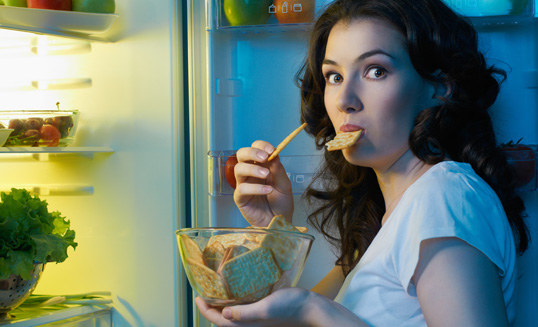A nutritionist shares how to eat late and still lose weight.

The question: So many people say not to eat after 7 p.m. But can late dinners and midnight snacks really thwart my weight loss goals?
The expert: Nutritionist Jaime Mass, M.S., R.D., L.D./N.
The answer: "A calorie is a calorie," says Mass. "If your total calorie intake for the day is greater than what you are burning, this can lead to weight gain regardless of what time it is." But if you eat healthy, regular meals throughout the day and typically have dinner around 8 p.m., there's no reason to stress.
Problem is, research suggests that many women take in nearly half of their daily calories at–or even after–dinner. One study found that a third of people consume 15 percent of their calories after 11pm.
"A lot of late-night eating can be associated with unwinding from a stressful day," says Mass. "This is where we can all get into trouble. If you are not truly hungry and you are responding to stress, it can be easy to overindulge and sabotage your healthy efforts."
What's more, binging close to bedtime can increase your blood sugar levels for a full 24 hours, according to one study in Obesity of Research & Clinical Practice. Meanwhile, research in the Journal of Clinical Sleep Medicine shows that noshing on high-calorie, high-fat snacks at night can make for restless sleep. The result: Overeating the next day in a feeble attempt to boost your energy levels, says Mass.
As a general rule of thumb, Mass suggests eating 90 percent of your total calories during the day. That should leave you about 150 to 200 calories to play with for a late-night (and guilt-free!) snack. Try munching on these 5 healthy late-night snacks.
Source www.womenshealthmag.com
Other Articles

- 3 Steps to Embrace the New You
- 18 Life-Changing Things to Do This Year
- Top Tips for Staying Healthy While Dining Out
- Why Consistency is more Important than Perfection
- 3 Ways to Put Movement Back into your Day
- How to make a New Year’s Resolution that sticks
- 8 Tips to Fall in Love with Healthy Eating (and stay there!)
- What to do this month - August
- What to do this month - July
- Staying Healthy at Work
- 5 Ways you can Reduce your Risk of Breast Cancer
- 5 Easy Steps to Weight Loss
- 4 Eating Habits For A Wrinkle-Free Skin
- 8 Weight Loss Mistakes
- 20 To Do’s To Avoid Catching A Flu
- 3 Reasons Why You Need to See a Nutritionist When You’re Pregnant
- Breast Cancer Awareness
- What does your hobby say about you?
- How Can You Improve Your Morning Mood?
- New Revelations Support Diet and Exercise to Reverse Leptin Resistance




